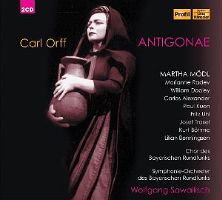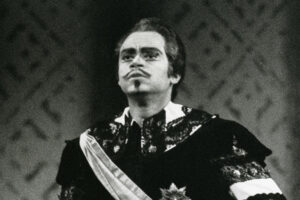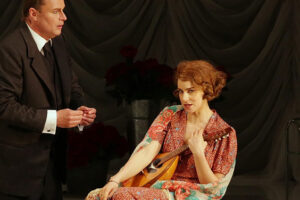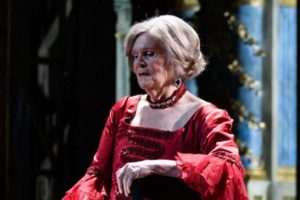
Carl Orff’s 1949 opera (or quasi-opera, as some critics have called it) Antigonae has been issued on 2 CDs on the Profil
label, in a Munich radio recording from 1958. This recording, conducted by Wolfgang Sawallisch and featuring the German soprano Martha Mödl in the title role, is a most welcome addition to this work’s documentation.
Antigonae is not for those who like their opera melodic and hummable. It is a dense, challenging minimalist piece that requires a committed listener and an interest in the dramatic and psychological aspects of the work as well as the music. Many of the sounds in this opera are not pretty and many might be called annoying; Orff’s work has inspired wildly different critical perspectives, from “ground-breaking” to “derivative.” I found it very rewarding.
The opera follows the ancient Greek play by Sophocles in an 1804 German translation by Friedrich Holderlin that very successfully maintains the potent and mysterious quality of Greek tragedy. Orff makes use of a uniquely percussive orchestration to highlight the drama, though most of the opera is sung a cappella. The use of ostenati in the orchestra, the frequently chant-like singing, and the fascinating use of a hybrid between speaking and singing combine to create a startling and thrilling dramatic tension that lasts throughout the piece. The inventive and varied textures of sound employed by Orff result in effects that are almost hypnotic and dramatically compelling.
This is a splendid performance. Sawallisch is absolutely masterful with both singers and orchestra, creating an astonishing palette of dramatic and musical colors while maintaining an exactness and clarity with Orff’s difficult rhythmic structure. The entire cast is composed of fine singing actors, and I’ve never heard clearer diction. Mödl is at her best here, singing with tremendous intensity and histrionic power. And, even though she sings mostly without accompaniment, she is unencumbered by the occasional pitch problems that sometimes arose in her technique. Mödl manages a three-dimensional character in this music, vulnerable and sensitive as well as powerful.
The entire cast is uniformly excellent, though I might have wished for a more exciting Kreon than that of Carlos Alexander. Baritone William Dooley is a standout as the Chorus Leader (Chorfuhrer) and the Chor des Bayerischen Rundfunks is extraordinary, maintaining the sense of foreboding throughout the drama.
Antigone’s story of personal and political morality has been produced in many forms over the centuries and in many languages. Carol Orff’s vivid version finds the heart of Sophocles’ original through its ritualistic and highly emotional elements. In the hands of Sawallisch and Mödl, it is music drama that moves and thrills.

























Comments